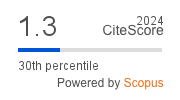The pattern of p53 gene mutations on oral squamous cell carcinoma
Vol. 40 No. 3 (2007): September 2007
Articles
September 1, 2007
Downloads
Agus, P. (2007). The pattern of p53 gene mutations on oral squamous cell carcinoma. Dental Journal (Majalah Kedokteran Gigi), 40(3), 119–122. https://doi.org/10.20473/j.djmkg.v40.i3.p119-122
Downloads
Download data is not yet available.
- Every manuscript submitted to must observe the policy and terms set by the Dental Journal (Majalah Kedokteran Gigi).
- Publication rights to manuscript content published by the Dental Journal (Majalah Kedokteran Gigi) is owned by the journal with the consent and approval of the author(s) concerned.
- Full texts of electronically published manuscripts can be accessed free of charge and used according to the license shown below.
- The Dental Journal (Majalah Kedokteran Gigi) is licensed under a Creative Commons Attribution-ShareAlike 4.0 International License

















